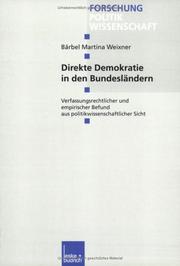| Listing 1 - 10 of 206 | << page >> |
Sort by
|
Book
Year: 2023 Publisher: Baden-Baden : Nomos Verlagsgesellschaft mbH & Co. KG,
Abstract | Keywords | Export | Availability | Bookmark
 Loading...
Loading...Choose an application
- Reference Manager
- EndNote
- RefWorks (Direct export to RefWorks)
Book
ISBN: 1849353743 Year: 2020 Publisher: Chico, California ; Edinburgh, Scotland : AK Press,
Abstract | Keywords | Export | Availability | Bookmark
 Loading...
Loading...Choose an application
- Reference Manager
- EndNote
- RefWorks (Direct export to RefWorks)

ISBN: 3531138529 Year: 2002 Publisher: Opladen Westdeutscher Verl.
Abstract | Keywords | Export | Availability | Bookmark
 Loading...
Loading...Choose an application
- Reference Manager
- EndNote
- RefWorks (Direct export to RefWorks)
Book
Year: 2023 Publisher: Baden-Baden : Nomos Verlagsgesellschaft mbH & Co. KG,
Abstract | Keywords | Export | Availability | Bookmark
 Loading...
Loading...Choose an application
- Reference Manager
- EndNote
- RefWorks (Direct export to RefWorks)
Book
ISBN: 9781326995089 Year: 2017 Publisher: Waremme René Janray
Abstract | Keywords | Export | Availability | Bookmark
 Loading...
Loading...Choose an application
- Reference Manager
- EndNote
- RefWorks (Direct export to RefWorks)
Book
Year: 2023 Publisher: Baden-Baden : Nomos Verlagsgesellschaft mbH & Co. KG,
Abstract | Keywords | Export | Availability | Bookmark
 Loading...
Loading...Choose an application
- Reference Manager
- EndNote
- RefWorks (Direct export to RefWorks)
Book
ISBN: 3748921225 3848777266 Year: 2020 Publisher: Baden-Baden : Nomos Verlagsgesellschaft,
Abstract | Keywords | Export | Availability | Bookmark
 Loading...
Loading...Choose an application
- Reference Manager
- EndNote
- RefWorks (Direct export to RefWorks)
Band 9 des Jahrbuchs für direkte Demokratie enthält Beiträge zur digitalen Transformation der direkten Demokratie bzw. zur elektronischen Weiterentwicklung der partizipativen Demokratie; zur Frage, wie direkte Demokratie populismusresistent gestaltet werden kann sowie zum Zusammenspiel zwischen direkter und repräsentativer Demokratie in Italien. In zwei Aufsätzen werden die Entwicklung und Praxis der direkten Demokratie in Liechtenstein und in Ungarn analysiert. Gewohnt sachkundig wird zudem über die jüngsten Entwicklungen in der Schweiz, in Österreich und in Deutschland sowie die Rechtsprechung zur direkten Demokratie berichtet. Einzelne Beiträge berücksichtigen zudem Entwicklungen im Zusammenhang mit der Corona-Pandemie bis Mitte 2020.Mit Beiträgen von Carsten Berger, Prof. Dr. Nadja Braun Binder, Dr. Clau Dermont, Prof. Dr. Cristina Fraenkel-Haeberle, Prof. Dr. Fabrizio Gilardi, Maël Kubli Eliane Kunz, Dr. Wilfried Marxer, Prof. Dr. Zóltan Tibor Pállinger, Prof. Dr. Arne Pautsch, Prof. Dr. Klaus Poier, Frank Rehmet, Prof. Dr. Margrit Seckelmann, PD Dr. Goran Seferovic, Prof. Dr. Nenad Stojanović, Prof. Dr. Axel Tschentscher, PD Dr. Andrea Töndury, Martin Widmer und Prof. Dr. Fabian Wittreck.
Book
ISBN: 9781108496636 9781108721776 9781108634397 Year: 2019 Publisher: Cambridge Cambridge University Press
Abstract | Keywords | Export | Availability | Bookmark
 Loading...
Loading...Choose an application
- Reference Manager
- EndNote
- RefWorks (Direct export to RefWorks)
"Standing out from all other books on direct democracy, Citizenship and Contemporary Direct Democracy connects the study of direct democracy to the broader field of comparative democratization and to an important strand in normative democratic theory. Analyzing the relationship between direct democracy and representative government, this book is organized around three main sections: the origins of contemporary direct democracy, its' functioning, and the ways to improve the use of direct democracy and its abuse. David Altman argues that citizen-initiated mechanisms of direct democracy constitute an important and viable way to reinvigorate current representative regimes by strengthening democracies' normative foundations--freedom and equity among citizens--which are particularly fragile in the context of unequal societies. Citizenship and Contemporary Direct Democracy demonstrates how citizen-initiated mechanisms of direct democracy empowers citizens, channels social demands, defuses violence, re-enchants citizens with politics, and breaks through some of the institutionalized barriers to accountability that arise in representative systems"--
Book
ISBN: 9782724623178 2724623177 Year: 2019 Publisher: Paris (117 Boulevard Saint-Germain 75006) : Presses de Sciences Po,
Abstract | Keywords | Export | Availability | Bookmark
 Loading...
Loading...Choose an application
- Reference Manager
- EndNote
- RefWorks (Direct export to RefWorks)
Les élites s'en méfient, les populistes le réclament. Les uns y voient un dévoiement de la démocratie, les autres l'outil imparable de la décision populaire. Deux visions caricaturales qui partagent le plus souvent une grande méconnaissance de ce qu'est réellement le référendum. Derrière son apparent simplisme (répondre par oui ou par non à une question), cette institution se révèle multiple (référendums d'initiative partagée, d'initiative citoyenne, votations, etc.). Un référendum peut produire des effets très différents, voire contraires, selon le contexte de sa mise en œuvre, la manière dont la question est posée, la façon dont les politiques et les citoyens s'en saisissent, etc. Reprenant une à une les critiques dont il fait l'objet, l'auteure défend l'idée qu'un référendum rénové pourrait, mieux que tout autre procédé de démocratie participative, restaurer le lien de confiance des citoyens avec le système politique et rendre la démocratie plus consensuelle.

ISBN: 3810034339 Year: 2002 Publisher: Opladen Leske und Budrich
Abstract | Keywords | Export | Availability | Bookmark
 Loading...
Loading...Choose an application
- Reference Manager
- EndNote
- RefWorks (Direct export to RefWorks)
| Listing 1 - 10 of 206 | << page >> |
Sort by
|

 Search
Search Feedback
Feedback About UniCat
About UniCat  Help
Help News
News